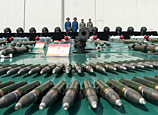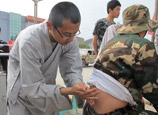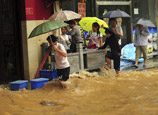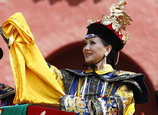
Local government officials said that the investment into the expo will benefit the entire city through an emphasis on a green lifestyle that combines livelihood, business and leisure.
After the expo concludes in October 2014, most of its venues will be kept there and remain open to Qingdao residents and tourists.
"The expo lasts only six months, but follow-up utilization will be a much longer period," said Li Fengli, secretary-general of the expo's executive committee.
"We will let it become part of the people's daily life as a natural and cultural heritage."
There will be a new functional district centered on the location, which is planned to cover a total area of nearly 200 square kilometers.
The site of the expo will become a new landmark tourism attraction. Some of the pavilions will be used to hold other exhibitions, while other facilities may be used for tourism services, cultural exchanges, business and scientific research.
Li noted that the development of the new district will be a long-term plan, and it will have a far-reaching impact.
The local government plans to develop the area into a new growth engine in northern Qingdao, Li said.
"It will be a window to the outside world and help narrow the economic gap between the northern and southern parts of the city," he said.
Compared with the coastal southern regions, the northern areas are relatively less prosperous, so the government has implemented a specialized development model for each region.
The city government will continue to focus on ecological recovery in the Laoshan Mountains as a crucial part of the development of the new district before improving the local infrastructure.
"The horticultural expo is not just a gala of gardening," Qingdao Mayor Zhang Xinqi said.
"More importantly it provides an opportunity to create a more eco-friendly environment that attracts the world's attention like a magnet."
Zhang said the effects of the expo will radiate throughout surrounding regions, promoting their economies and increasing their value.
With the boost to the city's profile that is sure to come from hosting the international event, local authorities expect to attract a number of green industries as well as top talent. There will be a software development park, high-end hotels, R&D centers and headquarter offices for small and medium-sized companies.
The flourishing industries will lead to the development of logistics and business facilities as well as tourism. Transportation infrastructure, such as roads, parking lots and overpasses will be added in the area.
It will also bring changes to the local economic and employment structure. Many former villagers are already finding new jobs in the service sector.
Li also said the data about the planning of the expo, the design of its pavilions as well as the many high-tech approaches used both inside and outside the venues will be sorted and kept as a "collective memory" of the city.
















 Heavy rain affects traffic in S China
Heavy rain affects traffic in S China


![]()
